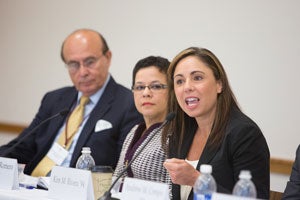San Antonio Mayor Julián Castro graduated from Harvard Law School in 2000 planning to run for city council back home, already inspired by mentors like Henry Cisneros, San Antonio’s first Latino mayor. His experience taught him to take responsibility for helping young Latinos trying to get ahead.
“We need to encourage and harness professional development in the next generation,” Castro said, harking back to his address to the Democratic National Convention when he credited his immigrant grandmother’s work in menial jobs that paved the way for his mother to earn a Master’s degree.
“We need to continue to answer the emails, write the letters of recommendation, take the time on the phone trying to answer the questions about the next step, and help high school students fill in gaps because their families haven’t had someone who went to college much less law school.”

Castro shared his thoughts in a keynote address celebrating Latino alumni at Harvard Law School. The second Celebration of Latino Alumni, held at Harvard Law School from Sept. 27 to 30, drew about 200 alumni and guests to the school to share their experiences and reflect on the path of social change.
Like many of the alumni panelists during the event, Castro trumpeted significant Latino advances in politics, government, and business and at the law school itself. But he also acknowledged that Latinos in the U.S. have a long way to go before their numbers as leaders in boardrooms, elective office and government match their segment of the population. Indeed, Castro lamented the backlash against Latinos via anti-immigrant and voter identification legislation sweeping the country. As daunting as those hurdles are, however, he said that they have stirred many Latinos to action in California and Arizona.
“The silver lining of voter identification legislation is that it gives the opportunity to folks to go on the offense and use institutions to register mass numbers of people,” he said. “But the second part is getting them to turn out.”
“We have a responsibility to activate, to support political leaders and civic leaders who support the Latino community,” Castro said. “The squeaky wheel does get the grease—the Tea Party has shown that.”
On the HLS front, Ambassador Abelardo L. Valdez LL.M. ’74 led off the Friday morning plenary on “Where We’ve Been and Where We’re Going” by hailing the growth in numbers of Latino students and the prominence of Latino alumni.
“We have a lot to celebrate,” said Valdez, who served Presidents Lyndon Johnson and Jimmy Carter. “We have had a quantum leap since the 1970s,” when only a handful of HLS students were Latino, none of them female, to the present 10 percent of the Class of 2012. But, he added, “We have a long way to go.”
Andrés W. López ’95, chairman, HLSA Latino Alumni Committee, moderated a panel titled “Where We’ve Been and Where We’re Going.” Panelists included: Andrew M. Crespo ’08, staff attorney, Public Defender Service for the District of Columbia; Jose Rivera ’13, President of La Alianza, Harvard Law School; Kim M. Rivera ’94, chief legal officer and secretary, DaVita Inc.; Ramona E. Romero ’88, general counsel, Department of Agriculture; and Ambassador Abelardo L. Valdez LL.M. ’74, president emeritus of the Council of American Ambassadors
Indeed, fellow panelist Ramona E. Romero `88, who is now general counsel to the U.S. Department of Agriculture, said her class had 25 Latinos. “But when I was here, this place felt very foreign to me. No one was there to tell me how important it was to get a clerkship or join the law review.”
But Romero takes seriously her role in seeing Latino representation grow. Before President Obama took office, she personally made sure that many resumes of Latinos highly qualified for positions in the government and on the federal bench were delivered to the transition team.
“We’re part of an elite. We have a responsibility to be present, to represent our institutions and support our pipeline,” she said. “We have a mechanism—this reunion shows it.”
Kim M. Rivera `94, who now is chief legal officer of DaVita Inc., said: “Now it feels like things have gained momentum in a serious way. We have more momentum and more access than ever before.”
But Valdez asserted that the gains fall short of where Latinos should be at HLS.
“We ought to be closer to 20 percent, not 10 percent.”
The need to recruit tenured and tenure-track Latino faculty members and to build programs to study Latino issues came up several times in various panel discussions and audience questions. Valdez made a point to note that there had been efforts to hire Latino faculty.
In a “Conversation with the Dean” on Saturday, Dean Martha Minow said that hiring Latino faculty members is a high priority and that in her first year as dean, a permanent offer was extended to a candidate.
Watch the conversation, with an introduction by HLSA Latino Alumni Committee Chairman Andrés W. López ’95.
“Since I have been dean, I have charged my hiring committee with the challenge of finding the most outstanding—and not just one, multiple—teachers who have a Hispanic background and identify with Hispanic issues.”
“We will continue to make sure that we have the very best people and we know the very best people will look like America.”
—Judy Rakowsky
